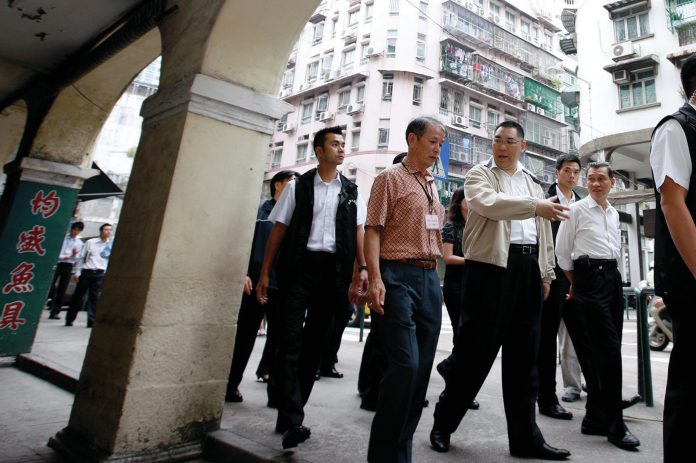“It is no secret that Chui Sai On himself is totally devoid of charisma,” says political columnist Éric Sautedé.
Sonny Lo agrees: “Chui is going to be remembered as a pragmatic, low-key Chief Executive who gets the job done, but did not have much charisma and neither did he make any significant change to Macau’s socio-economic and political development.” Not coincidentally, both commentators remember Edmund Ho as a CE of great charm.

 “Edmund Ho is remembered for four basic things: the liberalisation of the gaming industry (although it was not his decision) and the economic recovery of the early 2000s, the wealth partaking scheme (2008), and Article 23 (2009). Chui will at best be remembered for nothing, and at worst for being a caricature of what Macau politics had been for forty years,” concludes Mr. Sautedé, former Visiting Lecturer at the University of Saint Joseph (Macau).
“Edmund Ho is remembered for four basic things: the liberalisation of the gaming industry (although it was not his decision) and the economic recovery of the early 2000s, the wealth partaking scheme (2008), and Article 23 (2009). Chui will at best be remembered for nothing, and at worst for being a caricature of what Macau politics had been for forty years,” concludes Mr. Sautedé, former Visiting Lecturer at the University of Saint Joseph (Macau).
Hong Kong-based scholar Sonny Lo adds: “Minimal change within large continuities is a feature that can describe the Chui regime. Oversensitive measures towards the protection of national security in Macau is perhaps a blemish in the Chui Administration, which did not really face any political threats and legitimacy challenges, unlike the Hong Kong case.”
Like opinions come from several directions.
The former director of the Portuguese-language newspaper Plataforma, Paulo Rego, wrote in 2017: “The Chief Executive’s wear and tear has long since ceased to be a secret. It is not even because of the bad [job] he does, but especially because of the [damage] he does by proving himself incapable. Even in the case of their closest circle of power, because doing everything theywant they do little or nothing in relation to the aspirations of the local people and the main guidelines drawn up by the Mainland’s political and economic decision makers.”

“Chui will at best be remembered for nothing, and at worst for being a caricature of what Macau politics had been for forty years” – Éric Sautedé
Even scholars from the unlikely direction of IPM’s One Country, Two Systems Research Centre – namely, Professor Ieong Wan Chong – criticises the “passive administrative culture in Macau,” with the mindset of “no action leads to no mistakes”, that is incompatible with the nature of governance under the principles of ‘One Country, Two Systems’ and ‘high degree of autonomy’.
The problem of the lack of political skills on the part of Fernando Chui was visible during the mandate on several occasions. But none reached the proportions of those that occurred with the passage of super typhoon Hato over the MSAR.
 “The many blunders of the government have completely ruined the idea of ‘modern government’,” states Éric Sautedé, citing, precisely, that “the management of deadly Typhoon Hato is but just one extreme example that should have precipitated the resignation of the top executive.”
“The many blunders of the government have completely ruined the idea of ‘modern government’,” states Éric Sautedé, citing, precisely, that “the management of deadly Typhoon Hato is but just one extreme example that should have precipitated the resignation of the top executive.”
Unsurprisingly, in December 2017 the Chief Executive registered the worst ever approval rating – in fact, the worst since 1999!
Following the passage of Hato, the government of Chui was subjected to multiple criticisms, which forced him to an unusual gesture.
“In facing this disaster,” he said, “we admit that we have not done enough, that there is room for improvement. Here I represent the MSAR Government in expressing our apologies to residents.”
The CE also heard criticism for allegedly being little present in the follow-up of the cleaning tasks, which forced the Secretary of Security to make public that Fernando Chui accompanied him on the street more often than the media knew or reported.
For their part the Government Information Bureau called him ‘Brother On’ in a statement shared on Facebook this year.
 The family
The family
“Chui Sai-on is there only because he inherited his position (he is a Chui) and that his family pledged loyalty to Beijing back in the 1960s. Then, despite claims to the contrary, Secretaries have not been able to co-ordinate their actions and have been left to contend with one another,” claims Éric Sautedé, now based in Hong Kong.
Fernando Chui is from one of Macau’s few ruling clans, as was Ho and Ma. His late uncle Chui Tak-kei was a local Communist Party supporter when Macau was under Portuguese rule, acting as an influential mediator between the two sides.
Lawmaker Chui Sai-cheong, Vice-President of the Legislative Assembly, is his brother.
Chui’s family has interests in various businesses, especially in the real estate sector, although Fernando Chui no longer participates in the business that his father, who died in 1984, left both his children.
























